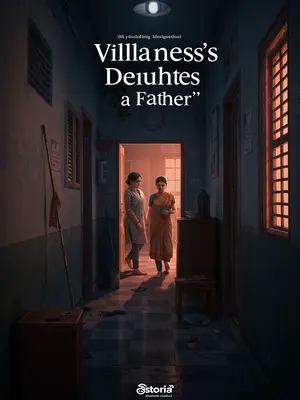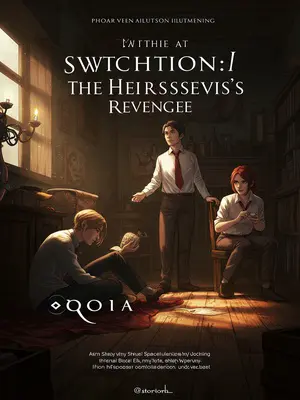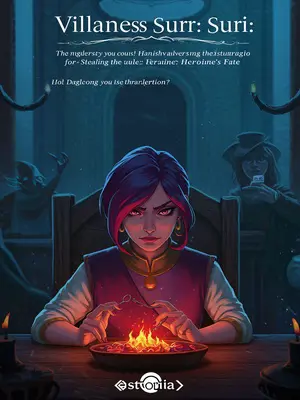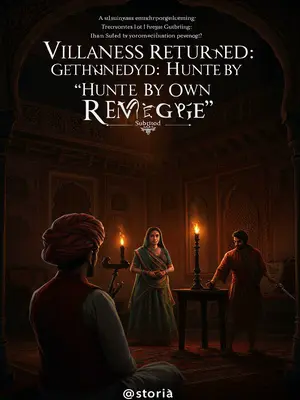Chapter 3: Food, Fights, and Family Tension
This family isn’t old-fashioned or patriarchal.
We didn’t have those 'ladka-ladki' debates over chai, and Dad never said things like, 'Beta, ghar sambhalna hai.' The room Mum prepared for me was about the same as Kabir’s, but since I was built like a tank, naturally the adults’ attention leaned toward the more delicate Kabir.
If I’d been the original Riya, I’d probably resent this “abnormal” brother for stealing my parents’ affection. But as a grown-up who’s already as numb as a railway ticket clerk after thirty years, I couldn’t care less about this harmless favouritism.
Sometimes I’d even wonder how the ticket wallahs managed with all that shouting at Charbagh station, and felt a certain kinship.
When it was time for dinner, I ate heartily.
Mum kept glancing at me, a trace of guilt in her eyes. She picked up a piece of mutton curry and put it in my plate: “Riya, eat more.”
A stainless steel tiffin sat nearby, still hot from the pressure cooker, and the air smelled of burnt masalas and cardamom, the TV playing some soap in the background with the volume turned low.
I looked at the mutton—half fat, half lean—and paused. “I don’t like this.”
It was true. I don’t eat fatty meat, only lean.
Hearing that, Mum’s face stiffened. She exchanged a look with Dad, who was silently eating on the side, then awkwardly moved the mutton from my plate to Kabir’s.
Dad scratched his head, avoiding my eyes, while Mum kept tucking stray strands of hair behind her ear, the silence suddenly feeling heavier.
The only sound was the ticking of the wall clock and the distant sizzle from the kitchen, as if the house itself was holding its breath.
Oh, so Kabir likes this stuff.
Somehow it fit—the gentle boy and his odd food preferences. I watched his hands pick up the mutton with careful, almost reverent movements.
I was about to keep eating when the Insta comments flashed again:
[What’s this supporting character up to now? That mutton looks delicious! She must be doing it on purpose!]
[She’s just trying to get her parents’ attention. So competitive at such a young age—definitely the type to fight other women when she grows up.]
[So annoying! Why did the male lead’s parents have to have this sister?!]
The comments scrolled faster than Whatsapp forwards in a family group chat.
I glanced at the comments and suddenly lost most of my appetite. After finishing the last few bites, I stood up: “I’m full. I’ll go back to my room.”
I wiped my fingers on the edge of my dupatta, feeling a little hollow as I stood. The clink of my steel plate echoed in the kitchen.
Seeing this, Mum half-rose from her seat: “Riya—”
I stopped and looked back.
At the table, the nearly forty-year-old woman’s eyes flickered. Her lips moved, like she wanted to say something, but in the end she just shook her head: “Go ahead.”
Mum’s voice was softer than usual, almost lost under the hum of the fridge.
I didn’t get it, but I put my plate in the sink and went back to my room on my own.
The corridor lights flickered—probably the voltage dropping again, as happens every summer in Lucknow.
Honestly, I’d expected things to be like this when I came home, so I didn’t really mind.
I thought the night would just pass like that.
I let myself flop onto the bed, half-listening to the distant call of a street hawker selling kulfi.
But unexpectedly, just as I finished my bath and was about to sleep, someone knocked on my door.
The knock was soft, almost apologetic. For a moment, I wondered if I’d imagined it—until it came again, gentle but insistent.
I thought it was Mum, so I went to open it.
But to my surprise—
It was Kabir standing outside.
His pyjamas were a little too long, sleeves covering his wrists. He stared at the floor, clutching something in his hands.
The boy stood awkwardly at the doorway, his black eyes fixed on me.
“Bhaiya, is something wrong?” I hesitated, asking.
What could he want with me in the middle of the night?
I tried to smile, softening my tone the way Dadi used to when I was scared at night.
Hearing my question, his expression tensed. He hesitated at the threshold, toes curling into the marble, the notebook pressed so hard to his chest it crumpled at the edges. He quickly raised his hand and handed me a notebook with some writing on it.
His fingers trembled just a bit, as if each movement took effort. He waited, silent, watching my face for a reaction.
I instinctively followed his motion and looked. When I saw what he’d written, I froze.
On the page was written—
Didi, what dishes do you like to eat?
Tell me, I’ll remember them.
Next time, we’ll eat what you like.
A small smiley face doodled beside the words, almost hidden by the careful handwriting.













